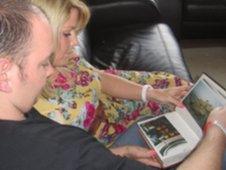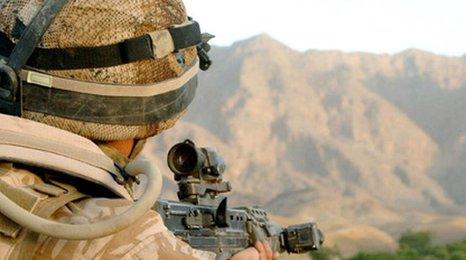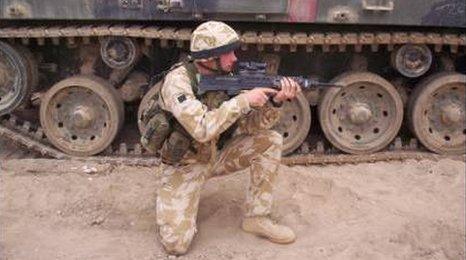Families of soldiers with PTSD 'need more help'
- Published
More needs to be done for the families of soldiers suffering from post-traumatic stress disorder (PTSD), say leading military charities.
The mental health problem occurs when troops are exposed to death and other serious battlefield experiences.
The side effects usually start once soldiers return home.
The illness can also have a dramatic effect on wives, children and other relatives, leaving them feeling confused and alienated.
Neil Blower used to be a keen soldier and couldn't wait to get his first taste of action at the age of 20.
But soon after he was deployed to Iraq in 2003 he saw something every soldier dreads.
Lasting impact
"I witnessed a man, a fellow comrade, lose his life and it is the single most horrible thing anyone can go through," he said.
Neil says he has never been the same but didn't realise the impact that moment had had on him until he met fiancée Sammy Welsh.
She's 25 years old and the mother of his four-year-old son, Ethan.
She says when they got together he seemed normal but after she moved in she saw a different side to him.
"He literally wanted to sit in all the time with the curtains closed and not even get dressed.
"I thought, 'This isn't right, this isn't how people are,'" she said.
Neil has post-traumatic stress disorder or PTSD. Symptoms can include nightmares, flashbacks, severe anxiety and depression.
More than 100,000 British troops have been deployed to Iraq and Afghanistan over the last 10 years and military charities estimate that thousands of them have been psychologically affected.
'Divorce more likely'
Although the government says the army works hard to look after the soldiers, the families say they're sometimes neglected and relationships suffer as a result.
The US Department of Defense says veterans who served in Vietnam and were then diagnosed with PTSD were three times more likely to divorce their partners than those who weren't psychologically affected.

Neil and Sammy look back at photos of Neil's deployment in Iraq
There are no equivalent figures here in the UK but many groups working in the field say it's an area that needs attention.
Combat Stress is a UK based charity which deals with former service personnel who have mental health problems.
It offers support to those who are affected by PTSD but insists more needs to be done to promote help available from the government and charities.
Spokesman Neil Cox said: "The most important thing is giving families and partners, as well as the veterans themselves, access to the right support."
The Ministry of Defence (MoD) says there's plenty of help for victims including medical support and advice prior to and post deployment.
'Support difficult'
In a statement, it told Newsbeat: "We also offer support and advice to the families of those personnel returning from operations.
"Regimental welfare officers, padres, and other associated organisations provide personal support to the wives and husbands of those affected by PTSD."
But critics argue there isn't enough help specifically for wives and children.
The Army Families Federation told Newsbeat that families of PTSD victims find it difficult to get support for their own mental health issues associated with being a military family from the MoD.
They say it's considered to be the responsibility of the NHS, but many GPs do not understand the complexities of military life.
Neil says there were several times when he thought his relationship with Sammy was over. Sammy says she's just glad she figured out where they could get help.
"I think there should be more help for the families, definitely, because up until the last few weeks I didn't even know there was help for the families.
"Eight years we've been together and it's a long time to keep everything bottled up," she said.
- Published12 March 2010

- Published9 February 2011
